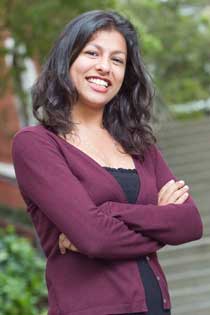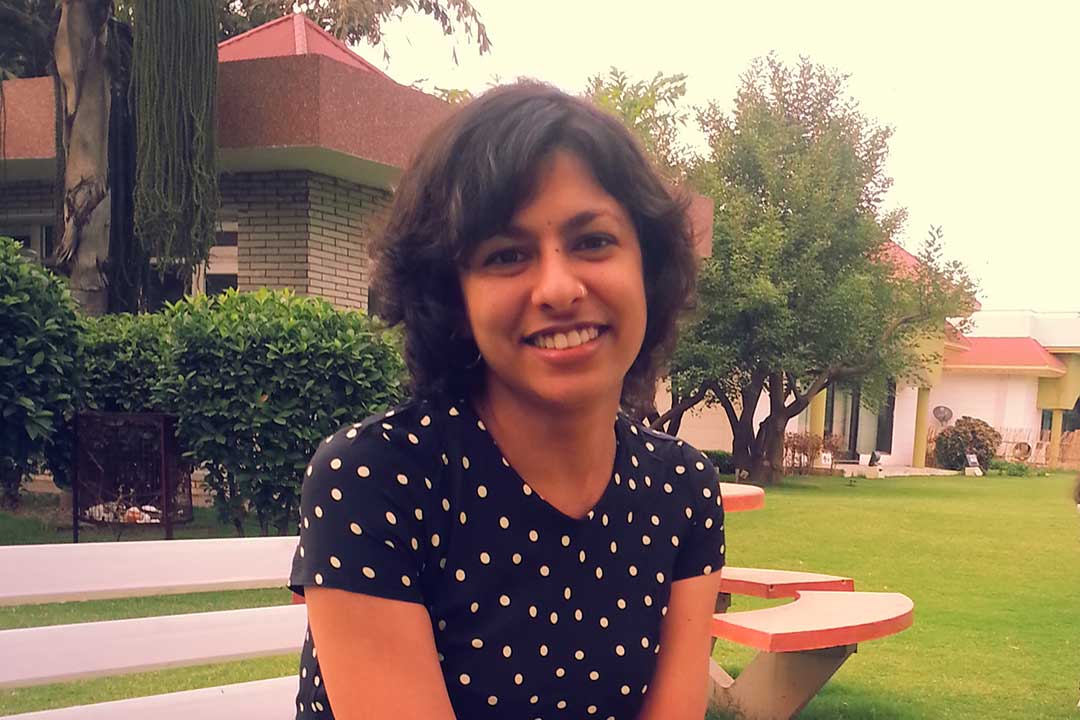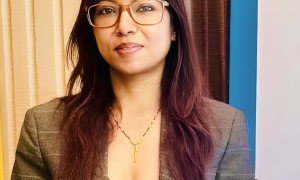 Chitrrangada graduated from University Institute of Legal Studies, Panjab University in 2010. She took a certificate course in Arbitration and Mediation from the WIPO Academy and thereafter in 2011 she went on to pursue her LL.M. from University of California, Berkeley.
Chitrrangada graduated from University Institute of Legal Studies, Panjab University in 2010. She took a certificate course in Arbitration and Mediation from the WIPO Academy and thereafter in 2011 she went on to pursue her LL.M. from University of California, Berkeley.
Chitrrangada is working as a legal assistant in a defense team at the Appeals Chamber of International Criminal Tribunal for the former Yugoslavia. Her job entails researching for and defending people who are indicted of international crimes. She has also worked in various high level and landmark cases at The Hague.
In this interview we asked her about:
- Studying at UC, Berkeley
- Interning and practicing at the Appeals Chamber of International Criminal Tribunal (Yugoslavia)
- Working in landmark cases and representing people indicted of international crimes
How will you introduce yourself to our readers?
Hi, I’m Chitrrangada. I’m a lawyer from India. After getting my license to practice at the Punjab & Haryana High Court, Chandigarh, I successfully completed my LL.M. at University of California, Berkeley. Since then, I’ve been working and living in The Hague for the past three years.
Did you ever feel that not being from an NLU was a disadvantage?
I graduated from the University Institute of Legal Studies at Panjab University in 2010. Itwas, at the time, the newly established institute setup by the university to offer a five-year B.A. LL.B degree. The faculty and administration, under the leadership of Prof. Dr. R.S. Grewal, was different from the three-year graduate degree in Law offered by the Department of Laws. The batch that I was a part of was the second batch to have graduated from this institute. At the time, we could not boast of a well-connected career placement programme. This experience would resonate with most newly established law schools in India and not just non-NLU schools.
Further, as I did not graduate from a National Law University, it would be unfair for me to make assumptions about the experiences of an NLU graduate. However, I would say that I did find myself somewhat disadvantaged when it came to opportunities in commercial firms.
Nevertheless, it would also be too simplistic to say that there is a bias against non-NLU students when it comes to professional opportunities. In retrospect, I think that the avenues, which each of them offers, are different. Therefore, what one can make out of the experience is also different. While the lack of facilities and the bureaucratic hurdles in state universities can threaten one’s chances, strangely, they also make you resourceful, resilient, and patient.
I believe that, having lived and worked in Chandigarh both at the district court level and at the High Court within a Chamber, helped me immensely during my assignment as an intern and legal assistant at ICTY defence. I was able to integrate faster within the daily court functioning and minimize the adjustment period greatly. More importantly, I was able to observe and learn from seasoned criminal law professors at university and work closely with trial lawyers at the district court level over a period of two years. This gave me invaluable experience, which I was able to obtain by virtue of being at Panjab University.
My law school experience varied a lot because of the subjects that were being taught each semester and the kind of projects I had aligned myself with every year. I was a mooter and that always kept things interesting. On an average, I was able to fit in a moot and a half per year in my schedule.
A large part of one’s experience at the university level is determined by the expectations one has of oneself and their career – and then to make the best out of the opportunities available. For me, while it was tempting to work in a high profile commercial law firm in India, I knew that I would miss the daily rush of being in court and working on criminal law cases. I worked from that bottom-line, upwards.
The institute faced a lot of logistical challenges on account of being newly established. However, overall, I would say that it was a positive experience.
In conclusion, I think the nature of the law school, in and by itself, cannot change much of your career path if you are aware of what your bottom line is.
How did tge certificate course from WIPO help your career?
I took a certificate course from the online WIPO Academy on Arbitration and Mediation Procedure under WIPO Rules under their Distance Learning Program. This program offers different courses on topics related to Intellectual Property over one year and most of them are free of charge. The courses being offered currently are available online here while the full list of the courses offered by this academy can be found here. This course had a fee but it was subsidised for students from developing countries. The course required a good knowledge of the fundamentals of IP law and I had already taken their General Course on IP.
Reading this course was quite fun actually. It covered three aspects:
- main features and advantages of the procedures designed by WIPO Arbitration and Mediation Center;
- selection of an appropriate means of dispute resolution; and
- drafting appropriate dispute resolution clauses for the purposes of a formal agreement.
I liked how it focused on the procedural aspects of IP dispute resolution. However, what I liked best about this course was that it helped me look at dispute resolution further in a better way. The course material covered the basics comprehensively and was quite interesting to read. I would recommend taking this course if you’re at all interested in exploring this area of law.
How did you decide to pursue an LL.M.?
Having a Master’s degree is almost a requirement for one to entertain the idea of a career in international law. Therefore, I’m glad that I was able to conclude that step at the first given opportunity before seriously building my professional experience around that goal. However, I do think that having some amount of professional experience before beginning the LL.M. helps one make more informed choices about how best to maximize on the one (or two) year(s) of study.
Further, successfully completing an LL.M. was important for me personally to understand whether or not a life lived abroad was for me. Even though it was at a big financial cost, I think that my experience at Berkeley was instrumental in shaping my life and career for the long term. I would have had a different opinion, had I decided to go back and work in India.
I had applied for admission into LL.M. in my final year of law school. I did not have vast amounts of practical experience as an advocate to boast of except for numerous mooting stints and internships as a student.I had planned the application in a way that would allow for the examiners to know about me as a person as much as possible. I used my application to show that I had made the best of my situation and would do the same with the opportunities available at Berkeley.
How different has Berkeley been when compared to your graduating university?
Both the universities were unique in their own respect, especially in how they shaped me as a professional. In retrospect, I am grateful for the experiences in each of these universities, as they were big stepping stones in how my career developed. Berkeley was different from Panjab University in a lot of ways. What I appreciated the most was the flexibility in planning one’s own curriculum. During the one year of the master’s programme, I was able to pursue both thesis and course track, along with the asylum law clinic, and take courses ranging from foreign investment law to mediation etc. to humanitarian law. This was quite beneficial to me as an entry-level professional; I was able to expand on my substantive learning and build upon my research and writing skills, while graining practical experience in dealing with clients, especially those that don’t speak your language.
Anything memorable that is stuck in your mind?
The year at Berkeley was quite memorable and it is difficult to isolate one experience out of the many. The course on International Business Transactions taught by Professor Buxbaum was a delight. The majority of the students in that class were LL.M. students who, apart from the class discussions and readings, were given specific problems to discuss. Personally, I found it quite exciting to observe the various ways and means of problem-solving from the perspective of 20-30 lawyers from around the world. Before this, I was wary of the differences but not of the manner in which they operate in terms of how a problem should be approached, researched, and solved as well as how the solution must be offered and expressed to the client. Not only was this class testing you on the laws governing international transactions in business, it was also preparing us to handle the geographical and cultural sensitivities in the legal profession. I thought that was great!
How did you apply for an internship to the Appeals Chamber of International Criminal Tribunal for the former Yugoslavia?
A fellow student from Boalt Hall had successfully completed a six months internship at the ICTY. I spoke with him about his experiences and the life in The Hague. After that, I decided to apply for an internship as well. The online application system on the ICTY website is fairly simple. I applied during my first semester of the LL.M. almost one year in advance of the starting date of the internship. This also gave me time and space to look for other opportunities during the LL.M. career fairs. When I got an offer for an internship at the ICTY, I also had an offer to intern in Los Angeles where I would work on community mediation projects and an offer to stay in Berkeley in pursuance of the J.S.D. degree. I was not able to obtain financial grant for the L.A. internship as well as the J.S.D., so I decided to defer my admission to the J.S.D. and take up ICTY.
While in The Hague, I was constantly exploring funding options and was able to obtain a grant from Sir Richard May Trust to cover my living costs for the duration of my internship. This went a long way in being able to extend my stay and look for further opportunities.
As an intern for the drafting team in the case of Prosecutor v. Lukic and Lukic, this was my first experience in a truly international working environment (Case Information Sheet, available here). I had a wonderful team to work in and everyone was very encouraging and supportive. I learnt a lot at this stage about the laborious process of judgement-writing in the appellate stage. Most importantly, I learnt that as a lawyer, one can never underestimate the significance of a carefully thought-out format. I worked on the preparations for the appeal hearing, including the deliberations between the judges.
You also worked as a Pro-bono Legal Assistant, Defence, Trial Chambers at ICTY. How did you get this opportunity?
I was recommended for this opportunity by my work supervisor at my internship in the ICTY Appeals Chamber. I applied right away and was selected for an interview. I was interviewed by a Senior Legal Assistant of the defence team. After having received an offer, I was able to start right after concluding my internship. I remember being quite excited about this opportunity. Criminal defence work at the international tribunals is quite hands-on and there is a lot of scope for learning and growth.
My work included substantive tasks like writing research memos on specific questions of international criminal law, statute of the ICTY, Rules of Procedure and Evidence; reviewing submissions to be filed before the Trial Chamber, as well as case management tasks like organisation of evidence and providing technical and research support to the Case Manager and the counsels during court hearings.
You are currently working at the ICTY as a part of the defence team. How is the work environment? Who are you representing? How did you start working on this case?
I am part of the defence team representing Jovica Stanišic in the case of Prosecutor v. Stanišic and Simatovic under Counsel Wayne Jordash and Co-Counsel Scott Martin (Case Information Sheet, available here). Mr. Stanišic was the head of the State Security Service within the Serbian Ministry of Internal Affairs during the regime of Slobodan Miloševic. I started working on this case in February 2012 when I was taken up as a Pro-Bono Legal Assistant in their team. I was hired as Legal Assistant four months afterwards.
In terms of the work, there was a steep learning curve in the beginning as this case covers very complicated aspects of the five-year conflict. However, I was lucky to have found myself in a team that was very dedicated, motivating, and good-humoured. They came through well together even during the most work-intensive and stressful times during the case. There is not one member of the team, who I have not learnt a lot from.
You also worked as a junior associate at Global Rights Compliance. What do they do? What was your job as a junior associate?
Global Rights Compliance, LLP provides international advisory services to business and government, including those operating in conflict-affected and other high-risk areas of the world, to identify, prevent, and mitigate adverse human rights impacts. Details of their recent projects can be found here. They are one of the very few pioneer firms that provide specialised services in international human rights law and responsible business practices, including public international law, international criminal law, and international trade and development.
My job as a Junior Associate involved conducting intensive research and drafting memoranda on international human rights law and regional treaties, UN Guiding Principles on Business and Human Rights, and complaint mechanisms under the OECD Guidelines for Multi-National Enterprises. I also assisted in preparation of training material on business and human rights and conducting country-specific due diligence on their human rights record and compliance with international human rights standards.
Earlier this year, I was also able to assist in the two short-term intensive training courses that were undertaken by Global Rights Compliance at NALSAR, Hyderabad on Business and Human Rights and International Criminal Law.
What is it like working to defend persons indicted of war crimes and crimes against humanity?
The work of the prosecution is complex, painstaking, and rigourous at any given situation. However, it is still incomplete without a well-functioning defence.
The criminal justice system is based on respect for human rights, among them being the right to a fair trial. To limit criminal justice solely to a severe contest between the prosecution and the defence and/or the victim and the accused amounts to undermining its objectives. Its objective is to aid the restoration of the imbalance caused by violation of human rights by ascertaining and affixing guilt under law. That restoration can not happen at the cost of the human rights of the accused.
It is honourable to be working towards assuring that a person, irrespective of their charge, is able to access his right to a criminal defence. Contrary to what is sometimes assumed in respect of the ethical issues relating to this aspect of legal work, I find this work quite meaningful and fulfilling. I don’t see criminal defence as more perverse (or hallowed for that matter) than any other job description in the legal field. It is an exciting,albeit delicate, job and it deserves to be done to anyone’s best of abilities.
Lastly what would be your message to all the law students who aspire to work at the International Criminal Tribunal?
I don’t have anything new to say because there is no generic formula for this. In my case, I sometimes feel like I’m making it up as I go along. But there is no right way of doing it. I would, however, advise not to shy away from applying to opportunities that you think you’re suitable for.
For a long-term career, you will almost definitely require a master’s degree. However, if you’re determined and hardworking, you will get there; to make life easier, it’s best to choose an LL.M. program that can provide you that opportunity. It is important to be mentally prepared to invest a good amount of time and energy in the initial few years; it can be quite a struggle.
Few of the internships are paid, for example, sometimes the Special Tribunal for Lebanon and the Extraordinary Chambers in the Courts of Cambodia offer stipends. However, most of the internships are unpaid but it’s possible to obtain grants for the entire duration or part of the internship.After my grant dried out and before a job came about, I was babysitting and dog-sitting after work as well.
I also know of some very determined people who have worked an extra job while interning in order to fund their stay.Lastly, it’s helpful to learn French and to be able to use it fluently. More obviously, it’s very important to like the work and to be committed to it, especially working in criminal law. And once you’re there, you should continue working on yourself.


























